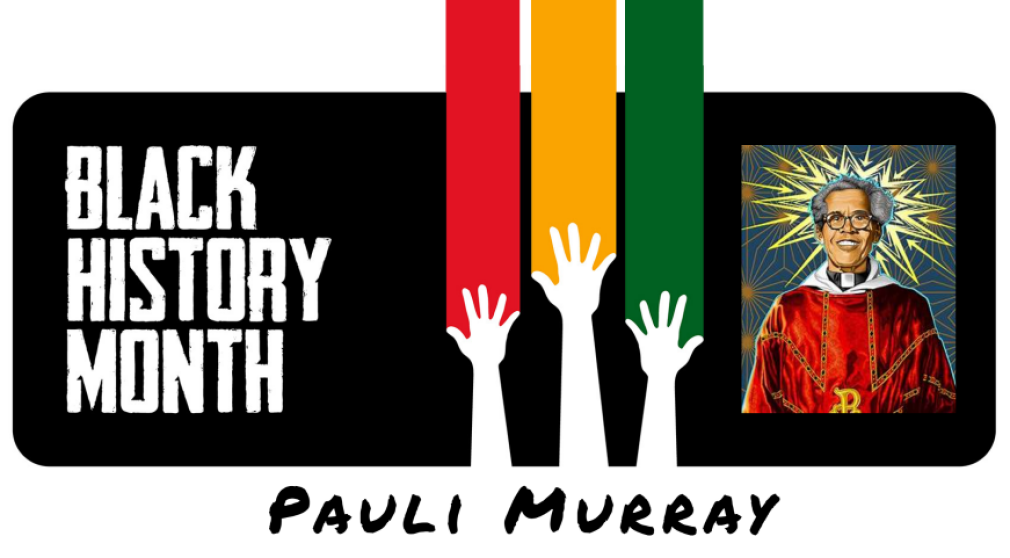Black History Month: Pauli Murray

Anna Pauline "Pauli" Murray (11/20/1910 – 7/1/1985) was an African American civil rights activist who became a lawyer, women's rights activist, Episcopal priest, and author. Murray was the first African-American woman to be ordained as a priest in 1977, the first year any women were ordained by the Episcopal church.
Murray, born in Baltimore in 1910, was orphaned at a young age and raised by maternal relatives in Durham, North Carolina, before forging a singular path to become a successful activist, poet, lawyer and memoirist and earner of many a far-flung distinction, among them becoming California's first Black deputy attorney general and the Episcopal Church's first Black female priest. Murray's brilliant writings about civil rights legislation were decades ahead of their time: Justice Thurgood Marshall referred to Murray's 1950 book "States' Laws on Race and Color" as "the Bible for civil rights lawyers.”
Murray's personal life and identity were complex: Murray was a multiracial person who identified as Black and a gender-nonconforming person who, likely because of contemporary social constructs, usually identified as female. As Rosalind Rosenberg, Murray's biographer, points out in West and Cohen's excellent new documentary, "My Name Is Pauli Murray," it's difficult to grasp Murray's foresight without understanding that it was this sense of in-betweenness that made Murray increasingly critical of all boundaries.
At the age of 16, she moved to New York City to attend Hunter College, graduating with a Bachelor of Arts degree in English in 1933. In 1940, Murray sat in the whites-only section of a Virginia bus with a friend, and they were arrested for violating state segregation laws. This incident, and her subsequent involvement with the socialist Workers' Defense League, led her to pursue her career goal of working as a civil rights lawyer. She enrolled in the law school at Howard University, where she also became aware of sexism. She called it "Jane Crow", alluding to the Jim Crow laws that enforced racial segregation in the Southern United States. Murray graduated first in her class, but she was denied the chance to do post-graduate work at Harvard University because of her gender. She earned a master's degree in law at University of California, Berkeley, and in 1965 she became the first African American to receive a Doctor of Juridical Science degree from Yale Law School.
As a lawyer, Murray argued for civil rights and women's rights. National Association for the Advancement of Colored People (NAACP) Chief Counsel Thurgood Marshall called Murray's 1950 book, States' Laws on Race and Color, the "bible" of the civil rights movement. Murray served on the 1961–1963 Presidential Commission on the Status of Women, being appointed by John F. Kennedy. In 1966 she was a co-founder of the National Organization for Women. Ruth Bader Ginsburg named Murray as a coauthor of a brief on the 1971 case Reed v. Reed, in recognition of her pioneering work on gender discrimination. This case articulated the "failure of the courts to recognize sex discrimination for what it is and its common features with other types of arbitrary discrimination.”
In 1973, Murray left academia for activities associated with the Episcopal Church. She became an ordained priest in 1977, among the first generation of women priests. In addition to her legal and advocacy work, Murray published two well-reviewed autobiographies and a volume of poetry. Her volume of poetry, Dark Testament, was republished in 2018.
On July 1, 1985, Pauli Murray died of pancreatic cancer. In 2012, the General Convention of the Episcopal Church voted to honor Murray as one of its Holy Women, Holy Men, to be commemorated on July 1, the anniversary of her death, along with fellow writer Harriet Beecher Stowe. Bishop Michael Curry of the Diocese of North Carolina said this recognition honors "people whose lives have exemplified what it means to follow in the footsteps of Jesus and make a difference in the world."[64]
In 2015, the National Trust for Historic Preservation designated the childhood home of Murray (on Carroll Street in Durham, North Carolina's West End neighborhood) as a National Treasure. In April 2016, Yale University announced that it had selected Murray as the namesake of one of two new residential colleges (Pauli Murray College) to be completed in 2017; the other was to be named after Benjamin Franklin. In December 2016, the Pauli Murray Family Home was designated as a National Historic Landmark by the US Department of Interior. In 2018, Murray was chosen by the National Women's History Project as one of its honorees for Women's History Month in the United States. Also in 2018, Murray was made a permanent part of the Episcopal Church's calendar of saints (she is commemorated on July 1).
On November 2, 2019, Rev. Dr. Pauli Murray was recognized as a Main Honoree by the Sesquicentennial Honors Commission at the Durham 150 Closing Ceremony in Durham, NC. The posthumous recognition was bestowed upon 29 individuals "whose dedication, accomplishments and passion have helped shape Durham in important ways.” In January 2021, a biographical documentary entitled My Name is Pauli Murray debuted at the 2021 Sundance Film Festival.

